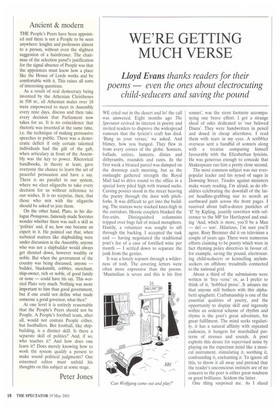Ancient & modern
THE People's Peers have been appointed and there is not a People to be seen anywhere: knights and professors almost to a person, without even the slightest suggestion of a hairdresser. The chairman of the selection panel's justification for the signal absence of People was that the appointees must know how a place like the House of Lords works and be comfortable with it. This raises all sorts of interesting questions.
As a result of real democracy being invented by the Athenian Cleisthenes in 508 BC, all Athenian males over 18 were empowered to meet in Assembly every nine days, discuss and then take every decision that Parliament now takes for us. It is no coincidence that rhetoric was invented at the same time, i.e. the technique of making persuasive speeches in public. There was a democratic deficit if only certain talented individuals had the gift of the gab, when articulacy in front of the Assembly was the key to power. Rhetorical handbooks, in theory at least, gave everyone the chance to learn the art of peaceful persuasion and have a say. There is no parallel in our system, where we elect oligarchs to take every decision for us without reference to our wishes. It is no surprise, then, that those who mix with the oligarchs should be asked to join them.
On the other hand. Plato, in his dialogue Protagoras, famously made Socrates wonder whether there was such a skill as 'politics' and, if so, how one became an expert in it. He pointed out that, when technical matters like shipbuilding were under discussion in the Assembly, anyone who was not a shipbuilder would always get shouted down, however wealthy or noble. But when the government of the country was being discussed, anyone — builder, blacksmith, cobbler, merchant, ship-owner, rich or noble, of good family or none — could have his say. This worried Plato very much. Nothing was more important to him than good government, but if one could not define what made someone a good governor, what then?
At one level it is entirely reasonable that the People's Peers should not be People. A People's football team, after all, would not contain People either, but footballers. But football, like shipbuilding, is a distinct skill. Is there a separate skill of politics? And, if so, who teaches it? And how does one learn it? Does merely knowing how to work the system qualify a person to make sound political judgments? Our esteemed editor must unfold his thoughts on this subject at some stage.
Peter Jones


































































 Previous page
Previous page